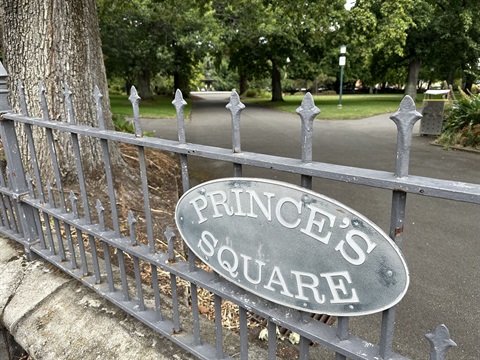
At each of the four main entrances to Launceston's Princes Square, fixed to the iron fencing, are oval signs proudly welcoming visitors to "Prince's Square".
One of Launceston's most picturesque parks, Princes Square was established in 1858 on the site of a disused clay brickfield.
Once known as St Johns Square, the park was renamed following the 1868 visit to Launceston by His Royal Highness Prince Alfred, the Duke of Edinburgh.
Today, the park is a popular lunchtime hub for CBD workers, with its mature oak trees, bench seating and meandering pathways. It's home to the iconic Val d'Osne Fountain, a tourist drawcard, as well as a statue of Launceston medical pioneer Dr William Russ Pugh.
However, the park's name sometimes causes confusion for visitors and locals alike, with people split into two warring camps — those referring to it as "Prince's Square", with an apostrophe, while others term it as "Princes Square" with no apostrophe.
City of Launceston Parks Planning Officer Matt Jordan is very familiar with Princes Square, having previously worked in the Parks Services team with oversight of the park.
"I helped maintain the space for several years — mowing lawns, planting annual displays, you name it," Mr Jordan said.
"During my career here at the Council the park has always been known by the operations teams as "Prince's Square" — with an apostrophe.
"The signs around the park suggest that's the correct name, and those signs have been there for the 20 years that I've worked here. I can only guess they've been there much longer than that.
"Within the operational world, we tended to work with what was in front of us, which was a great big sign saying "Prince's Square".
Asked if he'd ever received questions from the public about whether the name included an apostrophe, Mr Jordan was emphatic.
"No. You're the first person that has ever asked about it."
In our quest to settle the debate, we turned to the City of Launceston's electronic file management system to see what records had been created over the years.
One subject file was titled "Prince's Square — Please note correct spelling includes an apostrophe".
It seems "Prince's Square", with the apostrophe, is a popular version of the name.
Wikipedia's listing for the park styles it as "Prince's Square". TripAdvisor does the same. Likewise, J & D Morris' 1988 book History in Our Streets and Anne Green's 2006 book Places of Leisure in Launceston both postulate the apostrophe.
And, as already mentioned, City of Launceston signage at the entrance to the park also titles it "Prince's Square".
City of Launceston Spatial Data Officer Oka Santoso, however, maintains all of these references are incorrect.
"I deal with road names and place names on a regular basis for the City of Launceston and this is one that has come up multiple times," Mr Santoso said.
"Over the years we have produced thousands of maps and documents, many of them referencing Princes Square.
"In my role we need to get these names correct, and so we check them with the appropriate authorities, including Place Names Tasmania.
"And — as approved and recommended by Place Names Tasmania — this park is definitively named 'Princes Square', without an apostrophe.
The Council's GIS Systems Architect Daniel Guglielmi said Place Names Tasmania was the authority on place names across the State.
"Place Names Tasmania maintains a database of official place names for locations and it's here that we find our definitive answer," Mr Guglielmi said.
"On the official database, it's listed as 'Princes Square', without an apostrophe.
"And further, in the Tasmanian Place Naming Guidelines, under the 'Punctuation and apostrophes' section, we read that, 'An apostrophe to denote the possessive or associated 's' must not be used in a place name. Examples include Andrews Creek not Andrew's Creek, and Smiths Road not Smith's Road'."
"The signage is wrong — Launceston's Princes Square has no apostrophe."
However, Queen Victoria Museum and Art Gallery Senior Curator of History Jon Addison said he had a dissenting view on whether the signs were 'wrong'.
"The apostrophe versus no apostrophe debate is probably one that will continue to rage," Mr Addison said.
"However I think that all it really reflects is changes in official terminology in Australia — signs before 1966 have apostrophes, and afterwards, most lack them.
"This means that the signage on Princes Square is not necessarily 'wrong', as it was correct at the time of installation.
"The rules have changed and the sign has not.
"In 1966, the Geographical Names Board unilaterally decided to eliminate all apostrophes from Australian place names. This led to many Australian places having ungrammatical official names .
"Take 'Surfers Paradise', for example. There is little consistency in which countries follow this convention. Apostrophes appear in UK place names — but not in Cambridge, which banned them.
"Australia and the United States do not use them, although the US has some names that break this rule. Many countries in Europe use apostrophes in place names, but of course only in places where their language actually uses possessives in this way.
"Tasmania does have an exception to this rule. Break O'Day Council's official name does include a contraction apostrophe — as opposed to as possessive."
For the final word, we turned to Surveyor General and Chair of the Place Names Advisory Panel Michael Giudici for a ruling on whether Princes Square has an apostrophe.
Mr Giudici said anyone with a query about the correct spelling of a Tasmanian place name could search an online database at placenames.tas.gov.au
"In many instances, Placenames Tasmania also contains relevant information on what we know about the origins of Tasmanian place names, so it can be a really interesting resource to explore," Mr Giudici said.
"I'm also pleased to confirm categorically that, according to our official records, there is no apostrophe in Princes Square.
"This accords with nationally agreed guidelines on place naming which preclude the use of apostrophes that denote the possessive."






